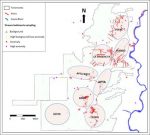
Shares of Saskatchewan’s Cameco (TSX:CCO), the world’s largest publicly traded uranium company were, predictably, walloped after the Sendai earthquake and tsunami of March 11th. On Monday, March 14th, the first day of trading after the Japanese catastrophe, shares of Cameco were down $4.62 to $31.70. The stock hit a recent high of over $43 in mid-February.
Canadian uranium stocks such as Mega Uranium (TSX:MGA), Paladin Energy (TSX:PDN) and UEX Corp. (TSX:UEX) were part of a worldwide sector selloff. Investors were no doubt taking stock of the fact that Japan accounts for more than 10% of the world’s uranium demand, but also that the event could slow the worldwide growth of nuclear power.
Uranium is a radioactive element and a critical component in the production of electricity through nuclear power. Cameco is the world’s second largest uranium producer, accounting for 16% of world production, and it sells 10 to 15 percent of that uranium to Japan.
In light of the fact that Japan soon had eleven of its fifty-four reactors off-line, the perceived effect on demand was swift. But a near-global reassessment of nuclear power as a safe energy source was not far behind. Germany and Switzerland decided to immediately freeze the development of nuclear power facilities while they assessed safety procedures. Venezuela, on Tuesday, halted its nuclear program outright.
Germany, Switzerland and France are, alongside Japan, the nations that rely most on nuclear power for energy. Germany has seventeen nuclear plants that provide about a quarter of the country’s electricity. Switzerland currently has five nuclear reactors that generate about 40 percent of the country’s electricity. France generates a whopping four-fifths of its energy from its fifty-eight reactors. On Monday, France joined Germany in urging the G20 nations to launch a worldwide nuclear safety push.
But despite the fallout of negativity affecting nuclear energy, some say it will pass. Analyst Peter Strachen says the situation will “…basically blow over in the next 12 to 18 months, as people realize that there’s no real alternative in the short to medium term, for large, baseload power supply.” Strachen points to a number of new plants being built in India, China and Brazil.
Analysts with The Bedford Report agree. They say that China is currently in the process of quadrupling its uranium consumption to fifty to sixty million pounds a year, and says it plans to build ten nuclear power plants a year for the next decade. Even as the Japanese crisis hit its darkest hour, with the crisis at the Fukushima Daiichi nuclear power plant still not contained, the Obama administration said that “nuclear power will remain a key component of America’s energy mix, despite worldwide anxiety over the safety of reactors.” The US currently has 104 reactors in 31 states.
Nuclear energy hasn’t been around for very long. The UK’s Calder Hall, which was the first station to deliver nuclear power in commercial quantities, connected to the grid in August, 1956. Despite this brief history some note that nuclear energy has a reputation for being quite cyclical.
Shyam Saran of Business Standard pointed out today that “In the 1980s, two-thirds of all nuclear power plants, mainly in Europe and the US, were canceled under the impact of the Three Mile and Chernobyl accidents.” Countries like Italy have abandoned nuclear, only to revive these programs in the recent nuclear renaissance.
Cameco, meanwhile, is taking a long view of the incident. The company’s soon to be outgoing CEO Jerry Grandey said the drop in share price of Cameco is “largely driven by emotion right now”, and that “growth in nuclear capacity in China, India, Korea and elsewhere -certainly China experiencing the largest expansion -has tremendous momentum and we expect it will continue.”
Check out our recent article: “Canadian uranium stocks slide in sector meltdown” CLICK HERE



 Follow us on Twitter
Follow us on Twitter Become our facebook fan
Become our facebook fan










Comments are closed.